Whether good or bad, the rise of VPNs in the technology sector hints at least one positive thing about internet users. That is, people are concerned about their online security. Indeed, the flurry of consumers in the VPN market has attracted more tech freaks to join the bandwagon.
But, a problem with newer VPNs is that you can’t trust their reliability and longevity unless they prove otherwise. That’s why the old VPNs appear more reliable.
One such VPN is PrivateVPN. Despite not being as popular as others, its resilient existence for such a long time has undoubtedly earned it some loyal users. Today, PrivateVPN is one of the trusted VPNs providing robust security to consumers.
But should you really prefer using PrivateVPN instead of other VPNs? In this PrivateVPN review, we will discuss and explore this service’s security and privacy features.
PrivateVPN quick overview
| Pricing | $2.00-$9.90/month (based on the duration of the subscription) |
| Country locations | Available in 63 countries |
| Number of servers | Over 200 servers globally |
| Simultaneous connections | Allows up to ten devices |
| Compatible devices | Android, iOS, Windows, macOS, Linux |
| Logging | No data-logging |
| VPN protocols | OpenVPN (TUN+UDP+1194, TUN+TCP+443), OpenVPN (TAP+UDP), L2TP/IPSec, PPTP |
| Data encryption | AES-256-CBC, GCM, 128-CBC, 128-GCM |
| Unblocks streaming Sites | Yes (Netflix, Amazon Prime Video, Hulu, Crackle, and more) |
| Support torrenting | Yes |
| Works in China and alike | Yes |
| Support | 24/7 live chat support |
| Free trial | No |
| Refund policy | 30-day money-back guarantee |
| Official website | https://privatevpn.com/ |
PrivateVPN pros and cons
- Unblocks BBC iPlayer, Netflix, Hulu and more
- Support up to 10 simultaneous connections
- Customizable encryption
- User-friendly apps
- Offers a 30-day money back guarantee
- Great for torrenting
- Small server fleet
- No-split tunneling on some apps
- Reduced speed on some servers
Background of PrivateVPN
PrivateVPN is a dedicated VPN from Privat Global AB, a Swedish firm. The VPN’s terms and conditions mention the company name as “Privat Kommunikation Sverige AB” with a precise Swedish address.
Sweden is a part of the 14-Eyes alliance, so you can naturally expect the software to log your data to some extent. But PrivateVPN boasts a (generally) no-logs policy.
The VPN service started in 2009, thus becoming one of the oldest VPNs that has endured all anti-VPN measures over the years. Throughout this time, PrivateVPN has offered premium privacy and security features to protect users, achieving a credible stance in this realm.
Currently, PrivateVPN boasts a customer base of over 75,000 and has secured 15,000 TB of data.
Let’s analyze the VPN for the basic parameters in this PrivateVPN review.
Servers and network coverage

The first thing we look for in a VPN is its server locations and network coverage.
Given the long period of its existence, we initially expected it to have a vast server network like the other old VPNs. For instance, ExpressVPN has over 3,000 servers, NordVPN has 5,400+, and Private Internet Access (PIA) has 35,000+ servers.
However, PrivateVPN does not have a vast network. Currently, the VPN lists just over 200 servers on its network, which is disappointing.
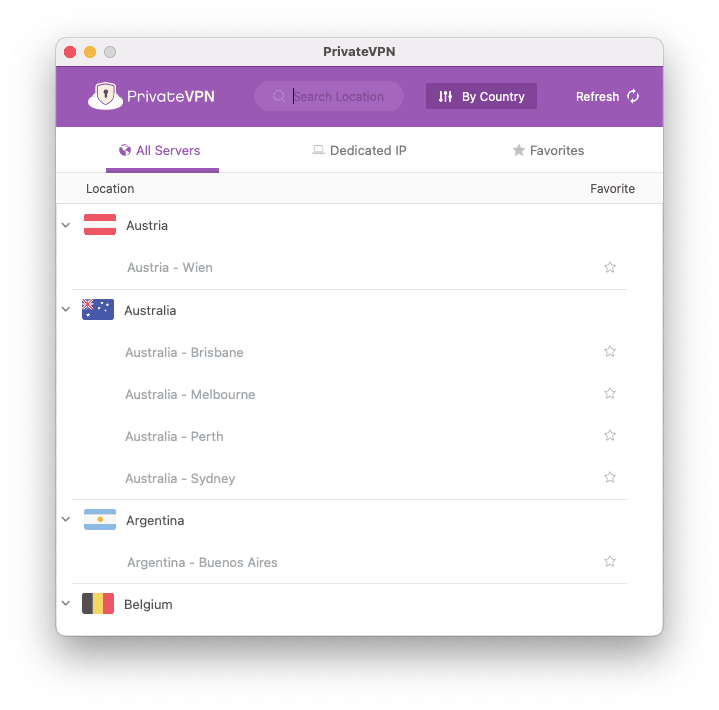
However, what’s good about PrivateVPN is that it still offers many locations. It precisely lets you connect to locations in 63 different countries.
That’s comparable with Surfshark, which offers 65 country locations with a massive network of 3200+ servers. Nonetheless, you can’t get more servers to connect to the exact location with PrivateVPN as you do with Surfshark.
PrivateVPN offers a network of 200+ servers in over 63 countries, smaller than other top-tier VPNs. The server list continually gets longer because some locations have multiple servers, but its app automatically selects the fastest server in the location you choose.
It has the ‘Dedicated IP’ and ‘All Servers’ tabs. The dedicated IPs enable you to connect with a specific IP address every time you establish a connection. These unique IPs make it difficult for streaming platforms to detect the servers as VPN traffic, making tracking your online activity almost impossible. In addition, dedicated IPs are not overcrowded, allowing them to provide lightning-fast speeds for streaming, browsing, and online gaming.
Moreover, PrivateVPN owns and manages all its dedicated IP servers without relying on any third party, enhancing your privacy and security. However, this VPN service does not offer any information on the advantages of utilizing dedicated IPs, making it difficult for beginners to access them. Luckily, despite its small server network, this VPN service rarely experiences speed drops, usually caused by server congestion.
PrivateVPN has over 7,000 IPs that are rotated at random. The figure below outlines the locations available on every continent:
| Continents | Locations | Nations |
|---|---|---|
| Europe | 41 | Belgium, Serbia, Austria, Bulgaria, Brussels, Cyprus, Croatia, Czech Republic, Finland, Estonia, France, Greece, Hungary, Ireland, Iceland, Latvia, Ukraine, Russia (2), Luxembourg, Poland, Lithuania, Moldova, Denmark, Malta, Norway, Germany (2), Sweden (2), Netherlands, Portugal, Romania, UK (2), Switzerland, Slovakia, Spain, Turkey, Isle of Man, and Italy. |
| Asia | 14 | Japan, Hong Kong, Singapore, Taiwan, South Korea, Malaysia, India (2), Philippines, UAE, Vietnam, Israel, Indonesia, and Thailand. |
| North America | 18 | Costa Rica, Canada (3 locations), Panama, Mexico, and the US (12 locations) |
| South America | 8 | Colombia, Argentina, Brazil, Chile, Costa Rica, Mexico, Peru, and Panama. |
| Africa | 2 | South Africa and Nigeria |
| Oceania | 5 | New Zealand and Australia (4 locations) |
Speed – Does PrivateVPN offer sufficient speed?
PrivateVPN speeds are not blazing-fast since they tend to slow down even on some nearby servers. We took the following 3 aspects into account during our PrivateVPN speed test:
- Download speed: It shows you how quickly you can receive data.
- Upload speed: It indicates how long it takes to share information.
- Ping: It displays the time it takes for your data to travel.
Fortunately, you can boost your speeds by switching to the OpenVPN UDP tunneling protocol. This protocol supports dedicated IPs and offers fast speeds. In addition, the nearest servers provide the best speed rates but suffer a 14% speed drop when you enable the Stealth tools.
PrivateVPN allows you to establish multiple simultaneous connections, making its servers prone to overcrowding. Unfortunately, it does not show users how many people are connected to a particular server. Furthermore, they should add the Wireguard protocol to improve the speeds. This VPN service does not have a vast network, which may cause its speeds to be slower due to congestion.
Also, PrivateVPN’s standard servers are usually faster than the dedicated IPs. Unless your base connection is slow, you can use this VPN’s dedicated IPs for gaming, streaming, and torrenting at comfortable speeds. Generally, PrivateVPN offers decent speeds, but there certainly is room for improvement.
PrivateVPN security
This VPN service provider is straightforward but incredibly secure. It has advanced security features like customizable encryption, a reliable kill switch to prevent data leaks if the VPN connection drops, multiple tunneling protocols, and a strict no-logs policy.
PrivateVPN offers superb security tools that maintain your online activity anonymously and safely. Furthermore, it is a great VPN provider for secure torrenting and streaming.
Encryption
PrivateVPN exhibited a premium performance by offering the best-in-class encryption. They use the Advanced Encryption Standard (AES) encryption in 128-bit or 256-bit. Both are robust military-grade encryption protocols that are uncrackable. Thus, applying these standards ensures highly secure data encryption.
Also, they employ SHA256 authentication coupled with 2048-bit RSA keys.
In their FAQ section, they describe the encryption technology:
“We use the default OpenVPN cipher Blowfish with 128-bit CBC encryption for TAP. With TUN, we use AES-256 and SHA256 for HMAC authentication. On top is a TLSv1.2, cipher TLSv1/SSLv3 DHE-RSA-AES256-GCM-SHA384, 2048-bit RSA.”
(We liked how PrivateVPN has mentioned these details in their quickly accessible FAQ section.)
Connection protocols
The more connection protocols a VPN offers, the better it facilitates users’ connection to the Internet and management of their privacy.
So, we checked PrivateVPN for the protocols it offers and didn’t have trouble finding relevant information.
Their website clearly lists all the protocols the VPN supports. We certainly found it the best in this regard. It supports almost all sought-after connection protocols to meet your browsing needs.
Here’s what PrivateVPN has for you.
- OpenVPN (TCP/UDP) – Windows, macOS, iOS, Android, Linux, routers (Asus, Tomato, Synology, DD-WRT, QNAP, pfSense)
- IKEv2 – Windows, iOS, Blackberry
- L2TP(L2TP/IPSec) – Windows, macOS, iOS, Android, routers (Asus, Linksys)
- IPSec – iOS, Android
- PPTP – Windows, macOS, iOS, Android, routers (Synology)
Doesn’t the list look extensive?
Also, PrivateVPN lets you connect a proxy or set up an SSL VPN as per your requirement.
However, the only problem is that your desired connection protocols may not be available to all your devices. Thus, if you have a particular requirement for this connection, you should check its availability for your device(s) before subscribing.
Kill switch
Kill switch is another VPN feature we deem necessary for every VPN. So, while testing PrivateVPN, we checked the service for one.
With PrivateVPN, you will find this feature named “Connection Guard.” As the service describes, Connection Guard shuts down your selected apps in case of VPN disconnection. That’s how it saves you from accidental exposure to actual IP addresses online.
While that’s helpful, unfortunately, not all PrivateVPN users can use this option. The VPN currently offers Connection Guard only to Windows users.
IP leak/DNS leak protection
While people usually consider the kill switch an IP leak protection mechanism, this isn’t the case.
A kill switch undoubtedly saves your IP from being exposed online in case of a service disconnection; IP leak protection basically refers to the accidental exposure of your genuine details online via other means, such as DNS, WebRTC, and IPv6. (Check out this guide on IP leak protection to learn about these things in detail.) Because of these leaks, you fail to access your desired content even after changing your location via a VPN.
With PrivateVPN, you don’t need to worry about this problem, as it offers thorough IP leak protection.
After going through the support articles on their website, we deduced that the VPN doesn’t support IPv6. Hence, it simply blocks IPv6 leaks (if enabled on your device) to prevent websites from tracking you.
Similarly, PrivateVPN also employs thorough DNS and WebRTC leak protection.
What’s remarkable here is that all these protection features are enabled by default. Therefore, you don’t have to meddle with your VPN app settings to activate these options.
PrivateVPN privacy
Does PrivateVPN store logs?
The dilemma is that most VPNs often falsely claim no logs. Since consumers today are always in a rush, they seldom spare the time to read the fine print and the tedious documents named ‘Terms and Conditions’ and ‘Privacy Policy.’
If you develop a habit of reading these documents first before using a service, there will remain no service making false claims about data security and privacy.
We mentioned this detail here because PrivateVPN seems to be one such VPN that makes doubtful (if not entirely false) claims.
Confused?
PrivateVPN clearly states on its site that it maintains no logs. (Check out the highlighted part in this snapshot.)
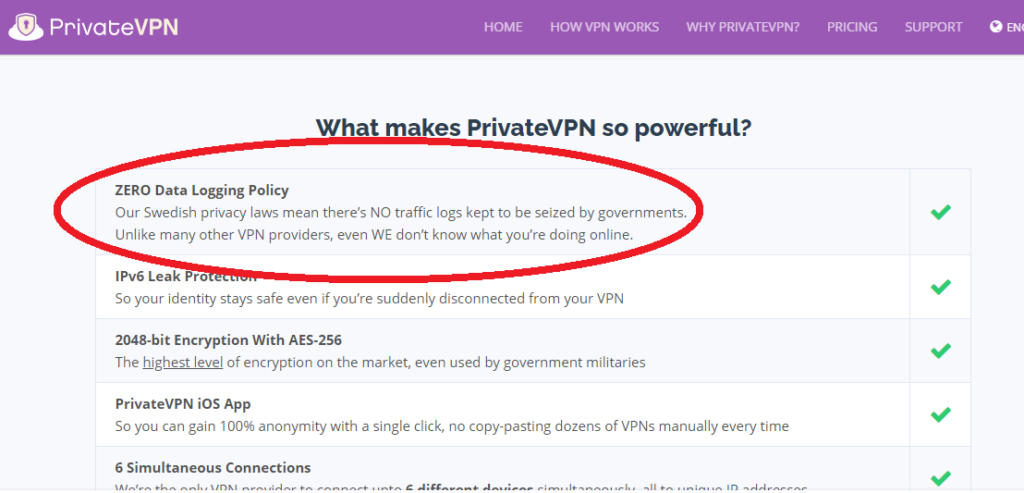
Isn’t it surreal?
But wait! Here’s another thing the service mentions in the FAQ section. (Note the word beside the word they highlighted themselves.)
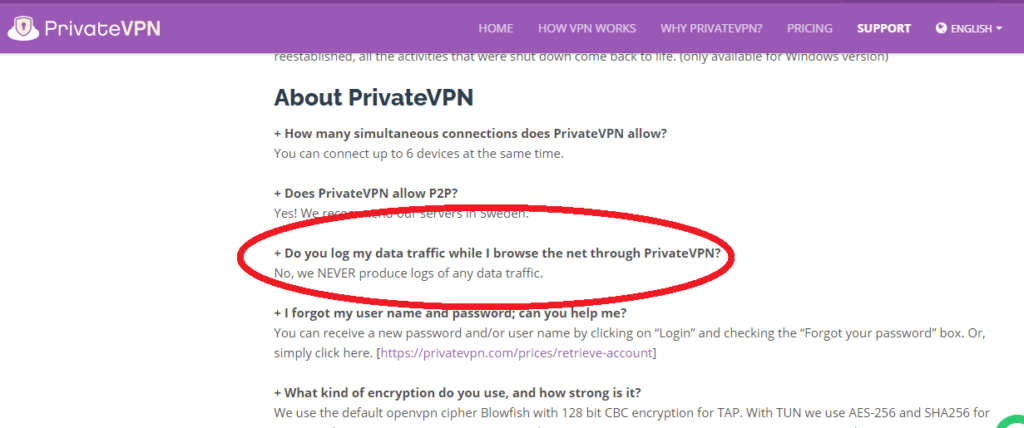
Did they write “NEVER produce” instead of “NEVER save”?
That’s where things become tricky. They have pledged not to “produce” logs, which indirectly means they store at least part of your information that could be produced otherwise.
Now, let’s visit their Privacy Policy. Here’s what they state:
“Our main principle is to collect only the minimal data required to provide our Service and for our users to remain as anonymous as possible. It is, therefore, our policy not to log or store any unnecessary data about our users. Hence, we do not collect or store logs of your activity, including no logging of browsing history, traffic destination, connection time stamps, DNS queries, IP addresses (neither allocated IP nor connected IP), data content, or bandwidth.”
This shows PrivateVPN isn’t into extensive logging of your data (like McAfee Safe Connect VPN).
However, they did mention storing at least some of your personal information for various marketing and service maintenance purposes.
Nonetheless, even with this minimal information, they have stated that you should share your data with law enforcement authorities if asked. Regarding their data-sharing policy, they stated:
“We will not disclose your personal data to any third party, except where (i) it has been agreed between PrivateVPN and you, (ii) it is necessary within the scope of our contract, (iii) it is necessary in order to fulfill a statutory obligation, comply with a decision of a public authority or court of law or (iv) in cases where we engage an external service provider or business partner who perform services on our behalf. We will never sell your personal data to third parties.”
Hence, you can trust the VPN not to monetize your data. But you can’t rely on PrivateVPN if you don’t want your government to know about you.
Since we strive to provide you with an unbiased review of PrivateVPN, we had to elaborate on this issue to clarify things.
Yet, this data-logging policy isn’t a problem for an average user like you and us. Of course, you should never use any VPN service to execute illegal activities. So, as far as you ensure an ethical use, you don’t have to fear government tracking.
Regarding how long they store your data, their Privacy Policy reads,
“The personal data is not saved longer than necessary given the purpose of the processing unless a longer storage time is required or permitted by law. The data might be kept longer if required for tax, accounting, payment processing purposes to ensure we would be able to defend or raise a claim or where we have a specific need – though we will generally not keep personal data for longer than two years following the last date of communication with you unless the data is necessary to provide the Service.”
Long story short, the no-logs policy of PrivateVPN isn’t comparable to that of other privacy-savvy VPNs like ExpressVPN or Surfshark. Yet, they don’t really abuse your data, either.
So, if you make sure to use the VPN for ethical purposes only and that VPNs aren’t illegal in your country, you don’t have to worry about PrivateVPN’s data-logging policy.
Company jurisdiction
PrivateVPN’s father company is Privat KommuniKation Sverige AB, located in Sollentuna, Sweden. Sweden is a member of the 5/9/14-Eyes Alliance, an agreement between governments to collect data on online users, but it exempts VPN providers from data collection laws. This makes it more lenient than the majority of Western nations. PrivateVPN’s strict no-logs policy also protects your data from invasive global arrangements.
Independent audits
Unfortunately, this VPN service has never been audited by a third party. Independent audits by cybersecurity companies validate if a VPN’s security activities, server infrastructure, and data management maintain your data safe and private. Most top-notch VPN service providers, such as ExpressVPN, have undergone these audits and had their zero-logs policy confirmed. Smaller providers, like PrivateVPN, may fail to take the initiative since the process is costly.
PrivateVPN key features
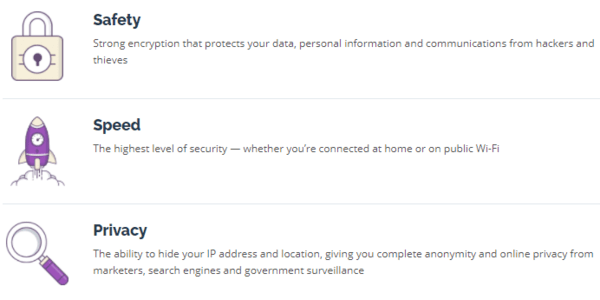
Despite VPN service providers’ enormous presence flooding the market, only some VPNs are considered reliable. The main reason behind this segregation isn’t the location diversity or the quality of data encryption. Instead, what matters here is the presence of features that facilitate the users.
This availability of additional features isn’t just a marketing tactic. Instead, this shows the VPN service provider’s vigilance and concern for its consumers’ safety and convenience.
A classic example of one such VPN is Surfshark, which, despite being new, has managed to attain a credible stance.
In the case of PrivateVPN, we felt a bit disappointed to see it missing out on some fancy features. Given the years-long successful existence of this VPN, we expected it to offer many features.
Stealth VPN
With ‘Stealth VPN, ’ PrivateVPN lets you browse stealthily. But what’s so special about it, we hear you ask?
Undoubtedly, every VPN service makes you anonymous online. Yet, the surveillance authorities and websites barring the use of VPN often employ “deep packet inspection (DPI)” technology to detect VPN use.
In simple words, they analyze the data packets of your web traffic. Since VPNs encrypt your data packets, the tracking authorities detect unusual packets and know you’re using a VPN. That’s how they block your IP (of course, your VPN IP), preventing you from accessing your desired content.
To combat this issue, PrivateVPN offers a ‘Stealth VPN’ mode.
With this feature, the VPN anonymizes your data packets to appear like regular data to the tracking entities. Thus, nobody would detect your VPN use.
Port forwarding
PrivateVPN takes a distinctive approach toward port forwarding. After establishing a connection, a random port appears on your screen, which you may then enter your torrent client. This feature helps torrent and set up a remote server.
Moreover, this tool is usually enabled automatically. This means that when you connect to PrivateVPN’s servers, you are assigned a random port number without the option of disabling it.
Proxies
PrivateVPN’s servers support SOCKS5 and HTTP proxies. Both proxies are helpful but in different circumstances. For example, the HTTP proxy functions solely with HTTPS and HTTP traffic, thus typically associated browsers. On the other hand, the SOCKS5 add-on is pretty secure and flexible, allowing it to support various kinds of traffic, such as torrent clients while boosting security.
PrivateVPN security add-ons
While VPNs already provide robust security, they become fun to use when taking care of other cybersecurity matters apart from network security.
For instance, Surfshark, Private Internet Access (PIA), and NordVPN offer features like adblocking and anti-phishing tools. The availability of such features saves you from the hassle of arranging an ad blocker separately. With a single VPN subscription, you can get an adblocker together with a VPN.
Unfortunately, we couldn’t find PrivateVPN offering any such add-on. So, if you choose PrivateVPN, be ready to pay for a VPN only.
Technical features PrivateVPN should consider
PrivateVPN lacks vital technological features that you would expect from a premium VPN service. Some of the features that they should consider adding in the future are as follows:
- Split tunneling: This tool is essential for excluding some apps, such as home controls, from the VPN tunnel.
- WireGuard support: It is a newcomer tunneling protocol that provides improved speed and security compared to traditional protocols.
- Multi-hop servers: They provide additional privacy and security against traffic-related attacks by routing your traffic through two servers instead of one.
- Diskless VPN servers: They ensure that your data logs are not stored on VPN servers, which is great for your privacy.
- Tracker blocker: It helps to increase your web privacy by preventing cross-site tracking.
Leading VPN providers such as ExpressVPN and NordVPN offer the features mentioned above.
PrivateVPN user experience

Regardless of how good a service is, it won’t gain traction unless it provides its users with enough convenience. The better the customer experience, the more the service will grow.
That’s why some apps or VPNs gain more customers despite not being perfect.
In the case of PrivateVPN, it seems the service providers know the importance of offering the best experience to the customers. That’s why they have survived for years and enjoy popularity despite tough competitors like NordVPN and Surfshark.
Let’s take a look at how PrivateVPN facilitates its users.
Device compatibility
What’s the use of subscribing to a VPN if you can’t use it on any device except your Windows PC?
Well, this isn’t the limitation with PrivateVPN.
In fact, PrivateVPN impressed us with its diverse device compatibility. By subscribing to PrivateVPN, you will find a native VPN app with PrivateVPN for almost every device you own.
It supports Windows, Android, macOS, iOS (iPhones and iPads), Linux, and routers. So, once you subscribe, you can download the respective VPN app on all your devices for thorough security.
If you wish to protect a device that PrivateVPN doesn’t support, such as your gaming console, you can secure it by connecting it to your VPN router running PrivateVPN.
Windows
PrivateVPN’s Windows app is easy to use. It pushes all notifications, allowing you to monitor your connection status constantly. Also, you can customize the main screen windows to simple and advanced displays. The simple view merely shows the status of your connection but allows you to change your current server location. On the other hand, the advanced view will enable you to customize the encryption and connection type and access the app settings.
The apps have some drawbacks, such as allocating different ports each time you connect and failing to show any servers on the streaming services tab.
macOS
PrivateVPN’s app for macOS is remarkably identical to the Windows app and includes more rounded keys to match Apple’s UI.
However, it lacks some features available on Windows, which does not make it less effective. Fortunately, it includes additional features like DNS leak protection and disabling specific apps when disconnecting from VPN servers.
Linux
PrivateVPN does not offer a desktop app for Linux users. It only offers instructions for setting up OpenVPN connections using PrivateVPN.
You must configure everything using the OpenVPN stack through a command-line terminal. It may not be the best experience compared to macOS and Windows, but the program offers reliable security.
PrivateVPN mobile apps
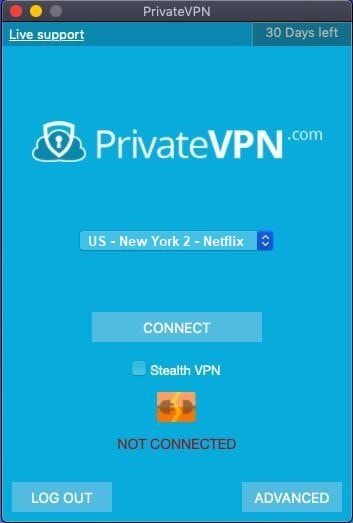
These apps employ the same design concepts as the desktop versions. The main distinction is that desktop apps appear smoother than mobile apps. This implies that mobile apps cannot match desktop apps in terms of user experience.
iOS and Android apps are simple and offer the bare minimum of what you anticipate from a mobile VPN. Unlike the iOS app, the Android app includes a built-in kill switch, which prevents data leaks if the VPN connection drops. Moreover, the apps allow users to switch to Stealth VPN and toggle the port they use. Also, you can change the tunneling protocols, encryption, dedicated IP addresses, and the list of all servers.
Download and setup
As we just explained, PrivateVPN has a very user-friendly app. You can also download and install the VPN without learning technical jargon.
Simply head to their website and sign up by choosing an appropriate subscription plan. Then, you can proceed with the PrivateVPN download on your device.
Once done, the VPN installs itself almost instantaneously without requiring much input from your side.
After the installation, you can sign in to the app using your account credentials. Then, you can establish your VPN connection by connecting to an appropriate server.
For beginners and those needing urgent VPN connections, the main page lets you connect your VPN with just one click. Clicking on the Advanced Settings menu will let you customize your app via Connection Guard, Stealth VPN, and other settings.
Simultaneous connections
How would it feel when you want to protect your personal network by securing all your devices with a VPN simultaneously, from robust security to ease of use, but your VPN doesn’t allow you it? Isn’t it annoying?
Obviously, you can’t simply disconnect your PC from the VPN just because you wish to use it on your Android phone for a while.
Fortunately, PrivateVPN saves you from this messy workaround by offering 10 simultaneous connections! That, too, without compromising on connection speed or bandwidth.
If your router supports 10 device connections, you can secure up to 10 devices by installing the VPN. Despite 10 active connections to your router, your router will count as only 1 connection, thus leaving the space for 9 more device connections.
Streaming – Does PrivateVPN unblock popular streaming services?
PrivateVPN is an excellent VPN service for unblocking major streaming platforms such as Netflix, Disney+, Hulu, BBC iPlayer, and Amazon Prime Video. During our tests, we did not encounter constant buffering or random restrictions. Its dedicated servers function the same as its leading competitors’ streaming-dedicated servers. In addition, we had no issues unblocking these popular platforms on our Windows and mobile devices.
If you face any streaming difficulties, you can contact customer support via live feature chat for assistance.
Unblocked: Netflix, Hulu, BBC iPlayer, Amazon Prime Video, HBO Max, Disney+, and other Platforms.
This VPN service works well with Netflix, considering just a few VPN providers can unblock most libraries. We tested all the dedicated servers that advocate for unblocking streaming platforms. Only 11 dedicated IPs could access the whole library, while 4 regular servers unblocked an extra section of content.
We accessed the entire Netflix library in the countries listed below:
| United Kingdom | Italy | Australia | United States |
| Spain | Netherlands | India | Sweden |
| Finland | Norway | Canada | Brazil |
Some servers failed to unblock all the libraries. Servers in New Zealand, Germany, Japan, Poland, France, Switzerland, and the Czech Republic only allowed us to watch Netflix Original shows, series, and movies. This is typical and not unfortunate, given Netflix’s constant attempts to block most VPNs.
We effortlessly accessed Hulu using dedicated IPs from the United States. We accessed Netflix with the Dallas normal server, which is the nearest server to us.
We had a few minor problems while accessing HBO Max before getting help from PrivateVPN’s customer support. While our screen displayed no error, we could not sign in despite using the correct credentials. However, customer support recommended reinstalling PrivateVPN, which eventually resolved our challenge.
Moreover, we could unblock Amazon Prime Video using 8 distinct PrivateVPN locations. We streamed libraries from Australia, Germany, the UK, the US, Japan, Switzerland, France, and Italy. However, we were blocked while using a dedicated Spain server, which gave us an error message indicating that Amazon Prime Video had detected the VPN.
In addition, we unblocked Disney+ using dedicated IPs from the UK, Canada, the US, Australia, and Italy. However, the US library was the most difficult to access because we were blocked on Edge and Chrome browsers while connected to a New York server.
Fortunately, a Los Angeles dedicated IP allowed us to sign in without issues. The Germany server was blocked during our test since it is a normal server that is not optimized for unblocking streaming platforms.
Finally, we could unblock the BBC iPlayer, Sky Go, DAZN Canada, ITV Hub, ESPN+, and Peacock. Many VPNs cannot unblock DAZN’s site, making PrivateVPN quite impressive. In addition, we streamed videos without buffering on Peer-to-Peer streaming platforms like Kodi and Popcorn Time.
Streaming copyrighted content is illicit and may land you in legal trouble. We recommend that you only stream copyright-free materials on P2P streaming platforms.
Is PrivateVPN suitable for torrenting?
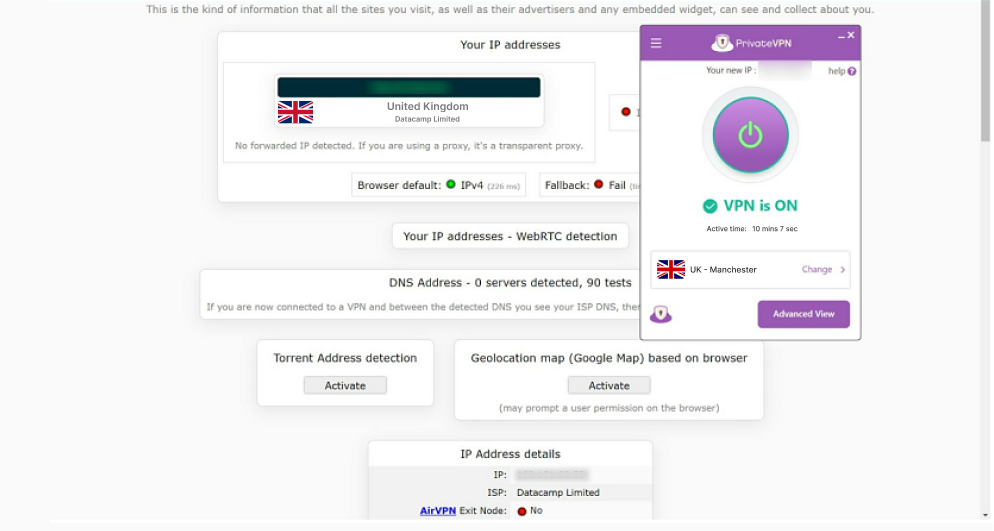
Well, this is something that many PrivateVPN reviews from customers also endorse.
PrivateVPN works seamlessly well for torrenting. Its stealth capability lets you stay under the radar while torrenting, and its fast-speed servers make torrent uploads or downloads much easier.
Since torrenting isn’t location-specific, you can connect to any fast-speed server. However, PrivateVPN typically recommends its Sweden servers for this purpose.
Moreover, this VPN doesn’t limit bandwidth for torrenting. You can enjoy unlimited P2P file sharing without worrying about government or ISP tracking.
Also, PrivateVPN offers port forwarding that facilitates your torrenting experience by letting you connect to more peers.
PrivateVPN performed really well during our testing as we attempted to download a torrent file. We could complete the download within a short time without speed lags.
Can I use PrivateVPN while gaming?
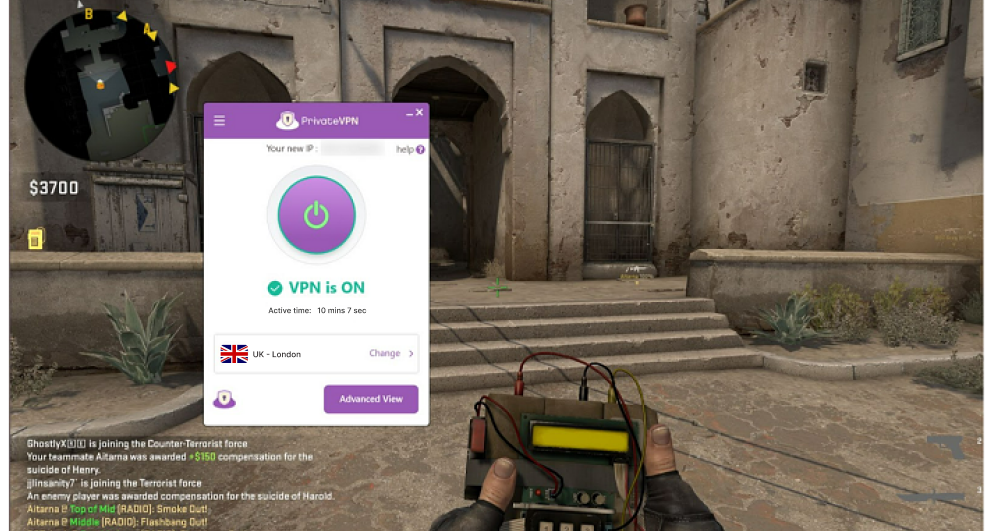
Of course, yes. Given how seamlessly PrivateVPN supports streaming and torrenting, you can expect amazing gaming support from this VPN.
Indeed, this VPN exhibited tremendous support during our testing, as we tried it during our Call of Duty and Fortnite sessions. While distant servers displayed a relatively slower (not too slow, though) performance, the nearby servers provided superfast speed.
Will PrivateVPN work in China?
China’s Great Firewall is definitely robust enough to block even the most resilient VPNs of today. However, PrivateVPN is one of those few VPNs that continue to serve the people there despite all restrictions.
However, to successfully use this VPN in China, the service recommends using the L2TP protocol since OpenVPN is vulnerable to DPI detection.
Besides China, PrivateVPN works excellently in other regions that restrict VPN use. For instance, you can also easily use PrivateVPN in UAE to unblock restricted sites.
Customer support
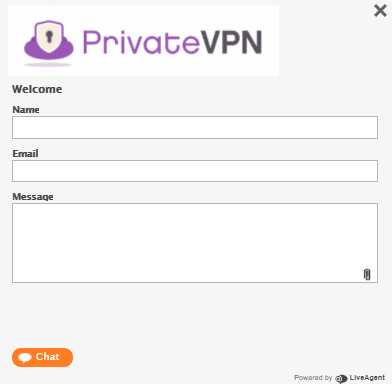
This is yet another facility that directly impacts the customer experience with a VPN service – prompt customer support.
Indeed, you won’t continue using a VPN if it isn’t there to assist you in your hour of need, right?
Although PrivateVPN boasts a prompt live chat feature, it doesn’t claim guaranteed 24/7 support. We noticed this when we interacted with their support team to assess the VPN as a customer before writing this PrivateVPN review.
Nonetheless, they don’t really leave their customers in trouble as they also entertain user requests and queries via email.
Plus, they have set up a dedicated FAQ section on the site to address your queries. For detailed information, you can visit their tutorial section, which includes many articles.
The only thing we didn’t like about PrivateVPN support was the need for a name and email address while interacting with them via live chat.
PrivateVPN pricing plans
After going through all the fantastic benefits PrivateVPN offers, you might think of it as an expensive security solution.
However, PrivateVPN is one of those few VPN services that offer premium security for the most inexpensive rates.
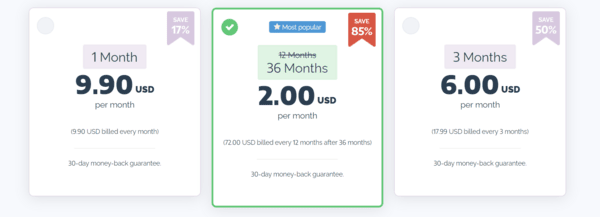
You can subscribe to this VPN for $9.90 per month. Whereas, if you subscribe to the three-month plan, you must pay $6 monthly. That’s how it supports your budget.
But the best deal is its 3-year subscription plan, which costs $2/month.
On top of these affordable plans, the VPN also offers a 30-day money-back guarantee. Thus, you really don’t have to look for the Free Download option for the PrivateVPN VPN. Your money remains safe when you subscribe to PrivateVPN.
Payment methods supported
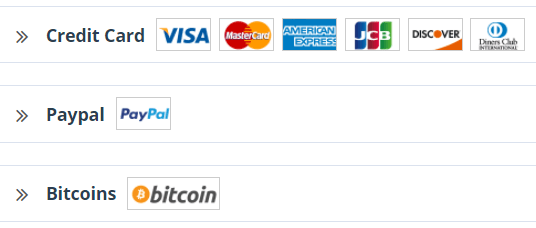
Do you have to arrange a payment method for the VPN’s subscription fee?
Well, PrivateVPN takes care of your convenience by supporting many options. You can use a credit card to pay the fee or choose the more feasible PayPal option.
Yet, if you’re hesitant to share your details, you can even choose Bitcoins as your payment method.
Does PrivateVPN offer Tor support?
After we experienced successful torrenting with PrivateVPN, we anticipated this VPN to support Tor as well.
So, if you are also looking for an answer to this question, the good news is that you can easily use PrivateVPN with Tor.
Whether it’s about the “Tor over VPN” or the “VPN over Tor” mode, PrivateVPN supports either.
For first-time users who wish to use Tor for enhanced privacy only (and not to access .onion sites), the VPN has included a detailed guide in its tutorial section. Follow the step-by-step procedure to set up a VPN over Tor connection.
PrivateVPN alternatives
PrivateVPN is an excellent VPN service, but there are better options available.
1. NordVPN
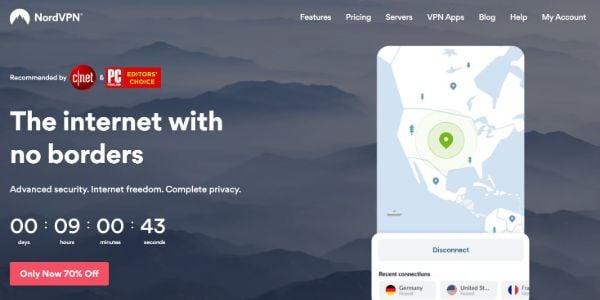
NordVPN features lightning-fast speeds and a network of over 5,400 servers in 60 countries worldwide. It is ideal for torrenting, streaming, and unblocking geo-restricted content in censored countries like China.
Furthermore, it offers advanced privacy and security features such as double VPN, AES encryption, IP/DNS leak protection, a kill switch, split tunneling, SmartDNS, Meshnet, and a zero-logs policy.
2. Private Internet Access (PIA)
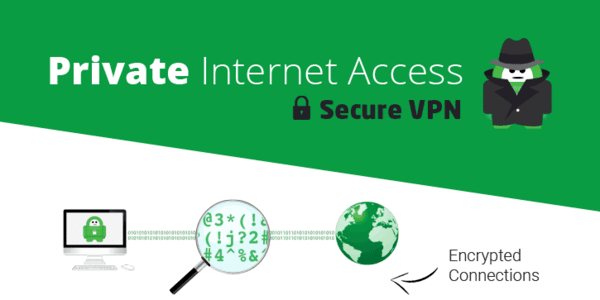
Private Internet Access (PIA) has a global network of 35,000+ servers in 84 countries. Its extensive network prevents VPN bans, speed issues, and server congestion. Thankfully, the VPN offers streaming-optimized servers, making it ideal for unblocking streaming sites and circumventing geo-restrictions.
Moreover, it supports the WireGuard protocol, unlike PrivateVPN. Also, it includes robust security and privacy features like a customizable kill switch, split-tunneling, multi-hop, and bullet-proof AES 256-bit encryption.
3. ExpressVPN
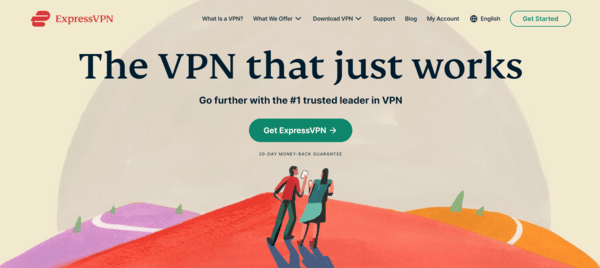
ExpressVPN boasts a vast server network compared to PrivateVPN, with over 3,000 servers in 94 countries. Also, it provides blazing-fast speeds and unblocks popular streaming platforms in geo-restricted areas.
Moreover, this VPN service has advanced security features that PrivateVPN lacks, such as split tunneling, RAM-based servers, and a verified no-logs policy. Other advanced features include a kill switch, military-grade AES encryption, and stealth browsing.
Is PrivateVPN worth using? Our verdict
Summing up our extensive PrivateVPN review, we can safely recommend this VPN to our readers.
That’s because the VPN has everything an average customer like you and us wants to have with a VPN. From robust security to ease of use, PrivateVPN offers all the features necessary to provide online anonymity to its customers.
Although, it doesn’t offer fancy features like adblockers. Nor does it have any free trial feature. Also, PrivateVPN doesn’t directly claim (and implement) a strict no-log policy.
But, considering the robust data security, support for activities like gaming and torrenting, capability to unblock Netflix and other rigid streaming platforms, affordable pricing plans, and the risk-free money-back guarantee, PrivateVPN is worth a try for all privacy freak netizens. As for the data-logs policy, we really wish to see the service providers come up with a more precise statement about it.
FAQs
Privat Kommunikation Sverige AB owns PrivateVPN, and its headquarters are in Sollentuna, Sweden.
No, because this VPN service does not offer free subscriptions. Fortunately, they include a risk-free 7-day trial and a 30-day refund policy. You must create an account using your email address to access these trials.
Yes, you may experience slight speed drops while using PrivateVPN. Most VPNs slow down your connection speeds since your traffic has to be redirected through servers. Despite the speed drops, you can still play online games without lag and stream without buffering.
